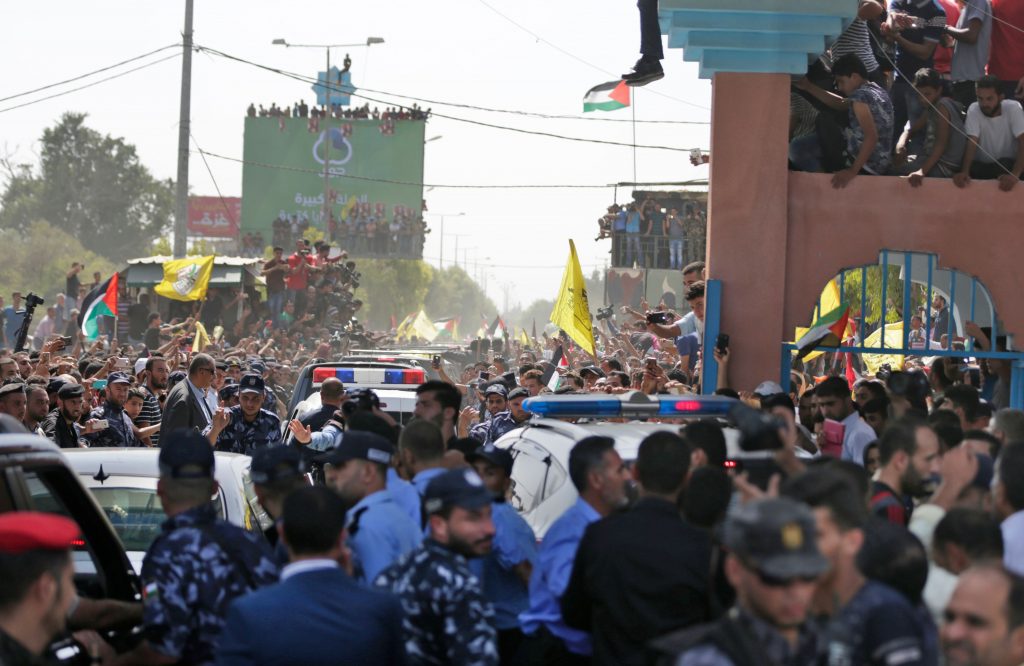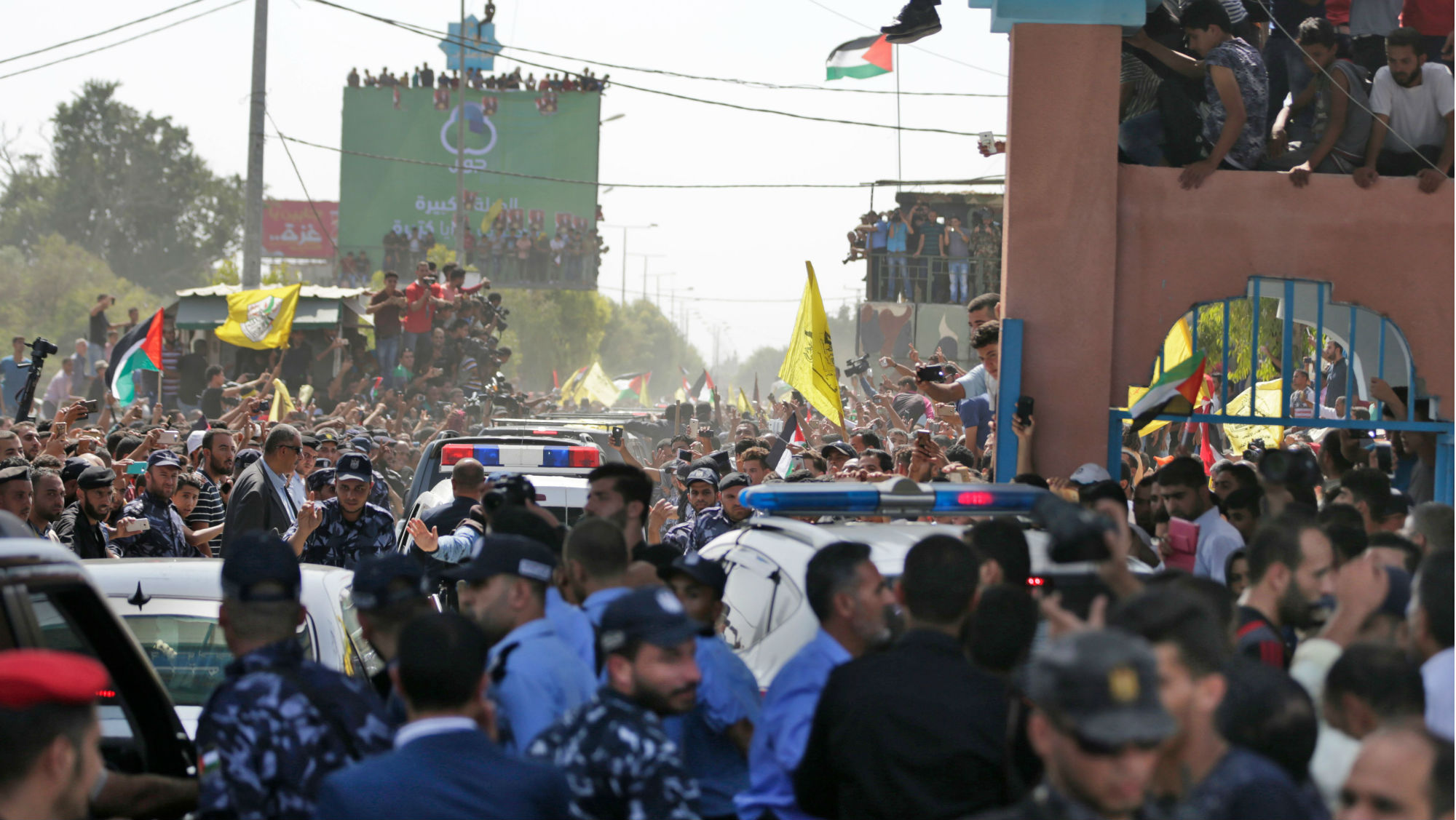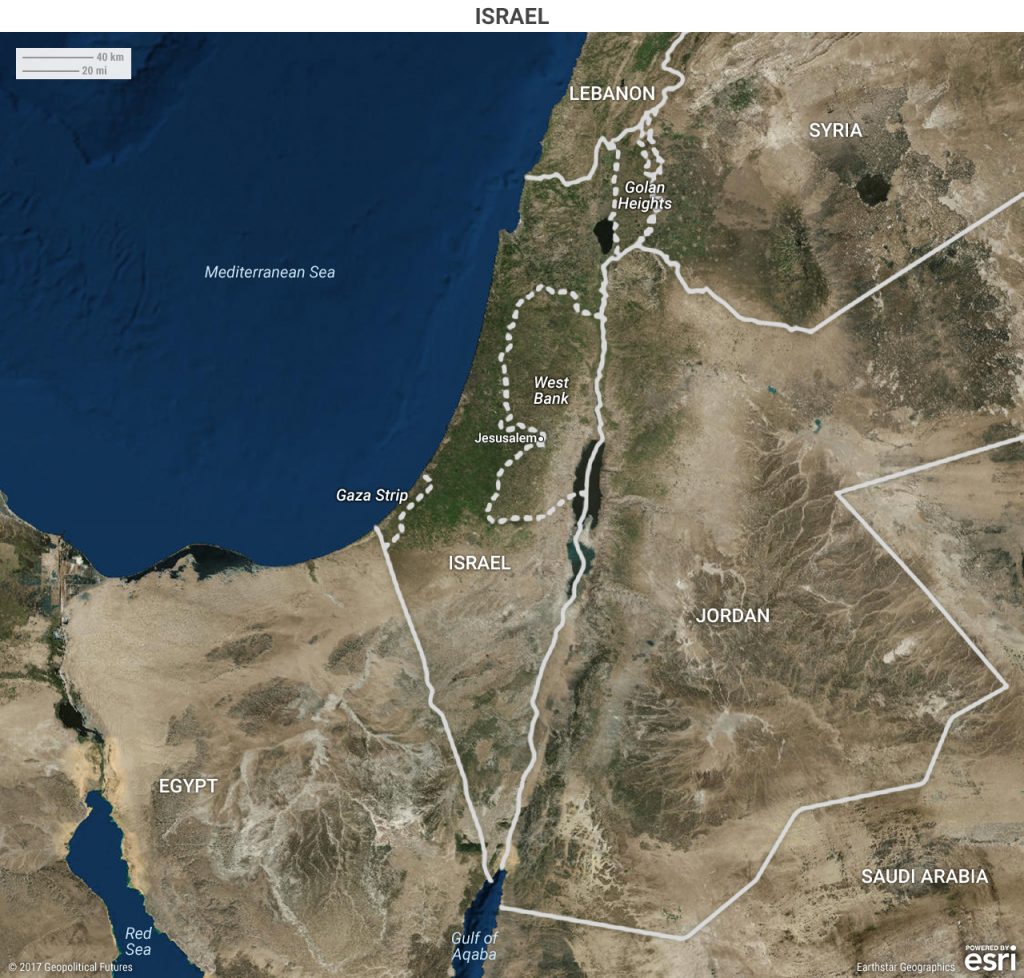By Jacob L. Shapiro
On Oct. 4, Palestinian Authority Prime Minister Rami Hamdallah and some 350 Fatah officials visited the Gaza Strip. It was Hamdallah’s first official visit to Gaza in two years. The purpose of the trip was yet another attempt at reconciliation between Fatah and Hamas, which, despite short periods of understanding, have been at odds with each other since Hamas took over Gaza in 2007. Normally, we wouldn’t pay much attention to the issue of Palestinian reconciliation – failed attempts are a dime a dozen. But this time, a realignment of the power structure of the Middle East is underway. This reconciliation attempt is part of the realignment, and that raises the stakes.
We must begin with a caveat: Reconciliation is not a foregone conclusion. Hamdallah’s visit, for all its fanfare and optimism, was essentially ceremonial. The two factions will meet in Cairo next week to iron out the details for the Palestinian Authority to take the reins of government from Hamas in Gaza. When it comes to deals such as this, the devil is in the details, and these details are complex. It is the Palestinians’ geographic misfortune that their population is split between two noncontiguous territories. The interests of those living in the Gaza Strip and those living in the West Bank are very different, and the spat between Fatah and Hamas is a symptom of that underlying problem. Sitting across a table from each other in Cairo isn’t going to fix the root cause of the problem.
But despite their differences, Gaza and the West Bank have one thing in common: They’re surrounded by hostile forces. Gaza is surrounded by Egypt and Israel; the West Bank is surrounded by Jordan and Israel. This makes Palestinians in both territories vulnerable to and dependent on foreign powers. If foreign powers insist that the Palestinian factions reconcile, Fatah and Hamas have no choice but to try. This seems to be what’s happening now, aided in no small part by the fact that Hamas may be eager to rid itself of the political authority it inherited in 2007 so that it can return to resisting the Zionist occupier rather than day-to-day chores like providing trash removal services.
The Timeline
That the impetus for this reconciliation attempt came from Saudi Arabia, Egypt and Israel becomes clear when you consider the timeline of events leading up to Hamdallah’s visit. In May, right before U.S. President Donald Trump traveled to Saudi Arabia, The Wall Street Journal reported that said Arab Gulf states were willing to take tangible steps toward normalizing relations with Israel. According to the report, in return Israel needed to make a significant overture, including halting settlement construction, toward restarting peace talks with the Palestinians.
Then, in early June, when Saudi Arabia undertook a diplomatic offensive against Qatar, Riyadh demanded that Doha stop supporting Hamas. (According to Haaretz, Hamas officials have since left Qatar at Doha’s request.) The primary reason was Saudi Arabia’s opposition to the Muslim Brotherhood (Hamas is an offshoot of the Egyptian Muslim Brotherhood), but a secondary benefit was that the demand was evidence to Israel that Saudi Arabia was not in Hamas’ camp. Shortly thereafter, the Times of London reported that Saudi Arabia and Israel were quietly discussing the possibility of establishing economic ties.
While all this was happening, Egypt was taking steps to bury the hatchet with Hamas, with which it had had difficult relations since the fall of Mohammed Morsi’s Muslim Brotherhood government in Cairo. By the end of June, Hamas had agreed to work with Egypt to create a buffer zone between Gaza and Egypt to help prevent the cross-border flow of militants and weapons.
Things picked up again last month. The U.S. renewed its emphasis on pursuing peace between Israelis and Palestinians – an issue that has foiled successive U.S. administrations of both parties. After meeting with Israeli Prime Minister Benjamin Netanyahu in September on the sidelines of the U.N. General Assembly meeting, Trump said at a press conference that the U.S. was working toward a peace deal between the Israelis and Palestinians and that he thought there was a good chance it could happen. That same day, Netanyahu had his first public meeting with Egyptian President Abdel-Fattah el-Sissi, and according to Netanyahu’s office, the two sides discussed Egyptian efforts to “achieve peace between Israel and the Palestinians and the region.” El-Sissi met separately with Palestinian Authority President Mahmoud Abbas on the same day.
 People gather at the Erez border crossing as Palestinian Prime Minister Rami Hamdallah’s convoy arrives in Beit Hanun in the northern Gaza Strip on Oct. 2, 2017. MAHMUD HAMS/AFP/Getty Images
People gather at the Erez border crossing as Palestinian Prime Minister Rami Hamdallah’s convoy arrives in Beit Hanun in the northern Gaza Strip on Oct. 2, 2017. MAHMUD HAMS/AFP/Getty Images
This is the context for the latest push for a reconciliation deal between Fatah and Hamas. The deal is being sponsored and pushed aggressively by Egypt, but Egypt has relatively little interest in playing matchmaker between Hamas and Fatah. Egypt’s interest is in cutting off militancy in Sinai, which it could do – and has been doing – with or without reconciliation. The more important players are Israel and Saudi Arabia, whose interests have converged on the need to curb Iranian advances in the Middle East. Though for very different reasons, Saudi Arabia and Israel view Iran as an existential threat. Both countries also vociferously opposed the Iran nuclear deal and were disappointed when the U.S. went forward with it.
The problem with the Saudis and Israelis teaming up to limit Iran’s expansion, of course, is that the Arabs and the Israelis are sworn enemies, and the domestic constituencies involved won’t simply accept an Israeli-Arab rapprochement without some kind of solution – however superficial or ineffectual – to the eternal Israeli-Palestinian conflict. This is what makes Egypt, which is generally aligned with Saudi Arabia (in no small part because of the vast financial support Riyadh has provided Cairo in recent years), so important. Egypt has formal relations and a good working relationship with Israel. Egypt’s stamp of approval on a Fatah-Hamas reconciliation gives Israel some reassurance that it will not face renewed war in Gaza. Egypt’s seal of approval is why Israel – usually critical of such efforts – went out of its way not to criticize the latest attempt at reconciliation. According to Al-Monitor, Israel also went out of its way to ensure that the Fatah delegation’s arrival in Gaza was as smooth as a “well-coordinated military operation.” Israel, then, appears to tacitly support the reconciliation effort.
Plan B
It’s important to look beyond the surface-level issues. For instance, Netanyahu’s pledge on Oct. 3 to support a bill that would see Israel de facto annex 19 West Bank settlements around Jerusalem made headlines across the world. His support might appear to undermine the notion that Israel is ready to make the grand peace gesture necessary to secure Arab recognition of Israel, but in reality, this is exactly the type of political maneuver Netanyahu must make before he can consider such a gesture. Annexing the settlements means they aren’t settlements anymore and gives Netanyahu breathing room in the event that he must suspend settlement construction in return for a normalization of ties with the Arab world.
Israel failed to prevent the U.S. from signing the Iran nuclear deal. If it can’t count on the U.S. to stand with it against Iran, plan B appears to be normalization with the Arab world by way of some kind of agreement with the Palestinians. From a strictly strategic point of view, this makes sense for Israel. Israel has never been stronger or more secure than it is today, and this is likely the high-water mark; the chaos around its borders won’t stay beyond those borders forever. In addition, the Palestinians are arguably weaker than ever, divided between Gaza and the West Bank and lacking a clear leader to take over once the aging President Abbas passes away. As for the rest of the Arab world, it is now more concerned about the Iranian threat than the Israeli threat and appears willing to make a deal. On top of it all, Netanyahu – who has served longer than any Israeli prime minister save David Ben-Gurion and who has the necessary right-wing credentials – is the only Israeli political leader with the clout to even consider such a move. It’s a low-risk, high-reward gamble for Israel. If it fails, there was no harm in trying. If it succeeds, Israel may at last secure the recognition of its neighbors.
At this point, of course, this is all speculative. A number of hurdles have to be cleared first. Reconciliation between Fatah and Hamas is only the first one, and it may crash on the same rocks that have broken all previous reconciliation deals. Getting a deal that both Israel and the Palestinian Authority can accept will be even harder, if not impossible. But this isn’t about peace between Israelis and Palestinians. The Israeli-Palestinian conflict has never been about just Israelis and Palestinians. It’s been an expression of the larger conflict between Israel and the Arab world, one that has consistently been used by outside powers that play on the Middle East like it’s a chessboard. The days when the Israeli-Palestinian conflict was the most important one for Arab states are over. Iran and Turkey are becoming more powerful, and the U.S. is becoming more disengaged. Strategic necessity can create strange bedfellows. The odds of reconciliation are long, but stranger things have happened in the Middle East.








 The Geopolitics of the American President
The Geopolitics of the American President